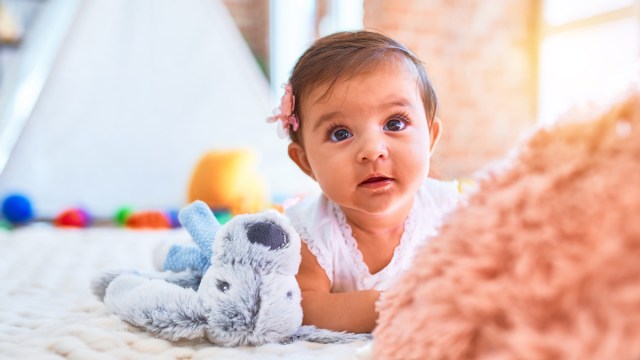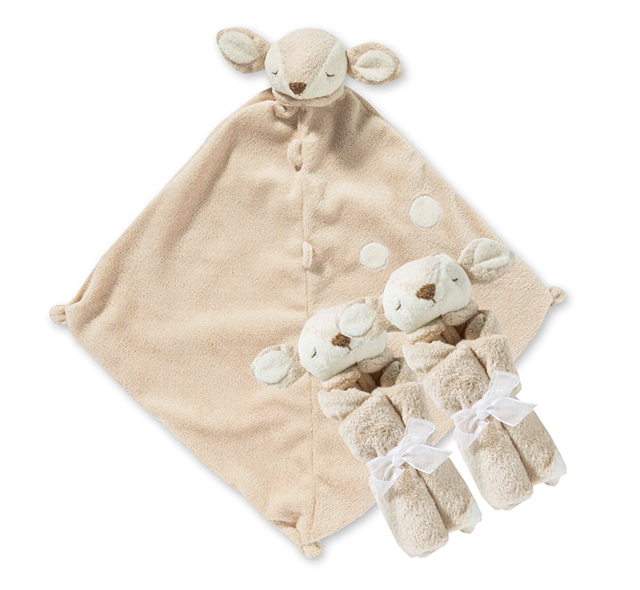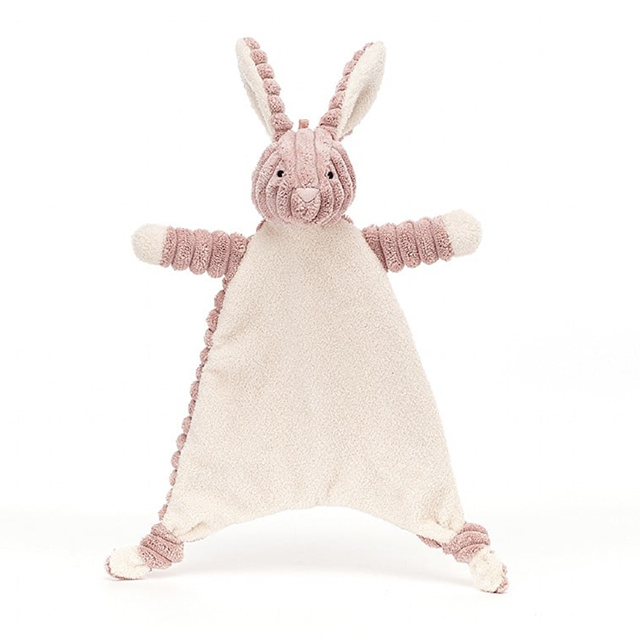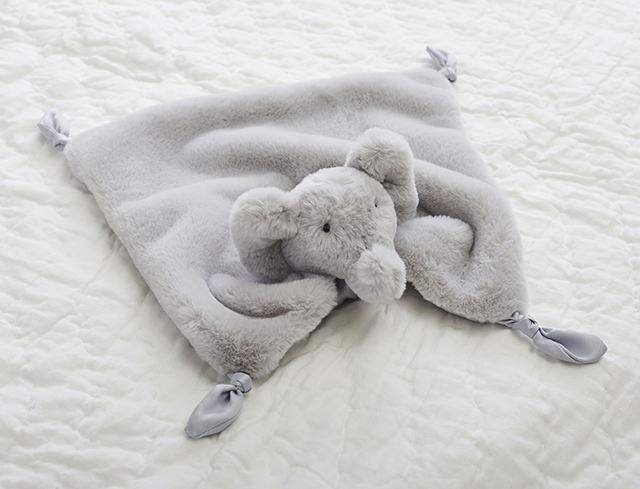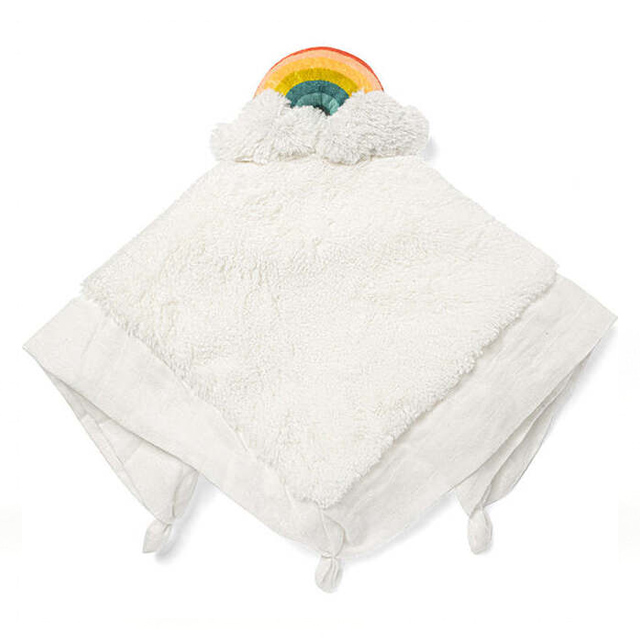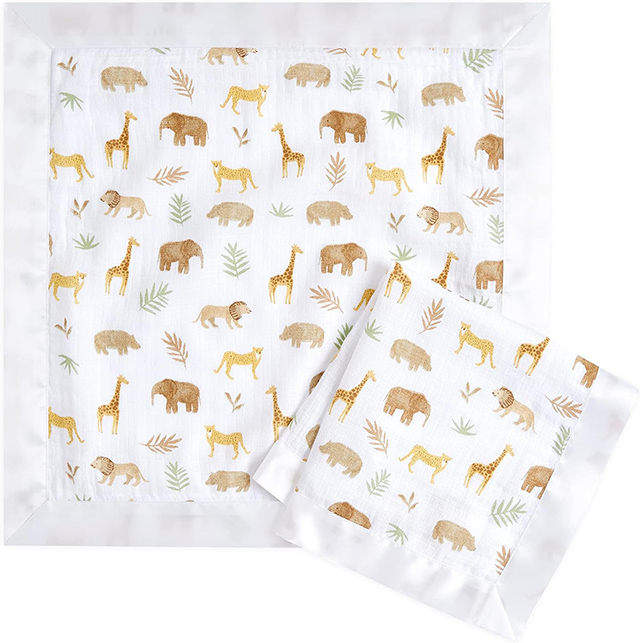Most of us remember our favorite stuffed animal from childhood—maybe a teddy bear, a soft bunny, or a plush dog that we snuggled so hard for so many years that it ended up tattered and worn. Parents tend to call these comfort items ‘loveys’—but in addition to being cute, they actually serve an important purpose for little kids. So how and when should your little one meet their new best friend? Here’s everything you need to know about introducing a lovey for baby.
What is a lovey and why do babies, well, love them?
“A lovey is usually a term that refers to an item a baby may hold or want while falling asleep, for comfort or self-soothing behaviors,” says Dr. Sara Siddiqui, a pediatrician at Hassenfeld Children’s Hospital in New York. This often includes stuffed animals, soft dolls, baby blankets, and other comfort items. Loveys aren’t just for bedtime, though—tots turn to them whenever they need a little comfort and soothing throughout the day. Think: in the stroller, on car rides, or just hanging out in your living room.
A lovey can help babies calm down during an episode of crying or irritability, Siddiqui says, and may offer comfort when mom and dad aren’t around. “[Loveys] assist in separation anxiety when the parent or loved one needs to leave the room.” After all, you can’t be within arm’s reach of your child all day, every day, so a lovey is a great tool to help them feel safe and secure when you’re out of sight. Research even shows that the act of stroking can signal the release of oxytocin, a hormone that helps calm and soothe the body, which is why you’ll sometimes see a toddler frantically petting their lovey when they’re feeling uneasy.
Because these items offer a sense of security, kids can develop an attachment to them at a young age. While many children bond with a soft toy or stuffed animal, others may form attachments to random household objects—even toothbrushes!—because they’re familiar and offer so much comfort. They may crave these objects when they’re feeling tired or sad, or processing other emotions. The image of a baby snuggled up with a comfort mop or hairbrush is hilarious, don’t get us wrong, but trust us—a stuffed toy is a lot more practical (and convenient) for most families.
When can I give my baby a lovey?
“The ideal age to introduce a comfort item would be around 9 months when the infant starts to experience separation anxiety,” Siddiqui explains. “Developmentally, babies [at that age] are forming object permanence and separation anxiety where they know who they are most comfortable with.”
Pro tip: choose a lovey that’s washable and relatively inexpensive, and grab a spare or two. This will come in handy if you need to wash the original, want to bring a beloved stuffed animal on a trip, or if the original lovey is lost, damaged, or discontinued.
How to introduce a lovey for baby
While introducing a comfort item to your baby may seem as simple as just handing it over, there are tips and tricks to help them form a bond. Some sleep experts recommend cuddling the lovey alongside your baby during storytime or while breastfeeding, while others suggest giving the lovey hugs and kisses in front of your infant before offering it to them. You can also tuck the lovey into your shirt or sleep with it yourself temporarily to help transfer your scent onto the material—a familiar and comforting sensation for your baby.
When can your baby sleep with their lovey?
While you may be tempted to throw your tot’s lovey into the crib at bedtime, sleep experts and medical professionals agree that no blankets, stuffed toys, or other loose objects should be added to an infant’s sleep space until they’re a year old. “Best practice is not to have [a lovey] during sleep as there may be a suffocation risk for infants,” Dr. Siddiqui agrees. “Always speak with your child’s pediatrician to discuss safe sleep practices.”
Once your babe is over a year old, feel free to give them a stuffed animal or favorite comfort object at bedtime. Over time, they may even come to associate the feel of the lovey with sleep and doze off more easily (fingers crossed). Just make sure it’s not a choking risk or a suffocation risk (skip the oversized or weighted stuffed animals, for example). You should also make sure it can’t be used to help them climb out of their crib. A large, firm stuffed animal that functions as a makeshift step stool in bed? No, thank you!
Can babies get too attached?
Generally speaking, this isn’t something parents need to be concerned about. Being emotionally attached to a comfort item (or ‘transitional item’) is a normal part of childhood development, and has known benefits for parents and kids alike. Self-soothing is a learned skill, and comfort is a good thing—people need it at every age and stage of life. So if your child seems obsessed with a certain soft toy or stuffed animal, know that it’s perfectly healthy and this phase will likely pass (or at least, the intensity of the attachment to that item will fade over time). If you have specific concerns, ask your family doctor for advice.
Some of our favorite loveys
All the products listed are independently & personally selected by our shopping editors.
If you buy something from the links in this article, we may earn affiliate commission or compensation. Prices and availability reflect the time of publication.
All images courtesy of retailers.
